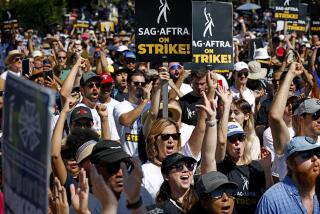SOUTHERN CALIFORNIA JOB MARKET : A SPECIAL REPORT ON EMPLOYMENT TRENDS : FINDING A JOB : COUNSELORS CAN HELP EASE THE TRAUMA OF LOSING JOB
- Share via
Bradford Taft barely had time to blink an eye before the trauma of unemployment set in.
“My boss told me I was relieved of my job, and after that there were still two bodies in that room but only one mind,” said Taft, who doesn’t recall a single word his former boss said after breaking the bad news. Taft now draws on that experience as head of Career Transition Group, a Los Angeles firm that assists displaced workers.
As Taft can attest, the hardships of unemployment are as much emotional as financial.
Particularly in the first days after being fired, job counselors say, people who lose their jobs face enormous mood swings akin to those experienced after the loss of a loved one.
“On day one, they’re angry. Day two, they’re very up because they’re thinking ‘I wasn’t that happy there anyway.’ Day three, it reverses again, and they’re saying ‘Oh, my God, what am I going to do? I’m a failure,’ ” said Anthony Kane, president of Univance Outplacement Consultants in Los Angeles.
To quickly help newly jobless people over this emotional roller coaster so that they can deal dispassionately with their new financial uncertainties and job needs, job counselors first try to “get them into a positive mind set,” Kane said.
“It’s crucial that we get them to look beyond trying to turn their bosses’ minds around and beyond thinking about having no visible means of support, no status and no support from family and friends,” said Taft, who was an executive search consultant before switching into what’s known as the “out-placement” field.
“They have to sit down and list all of their skills and write an action plan.”
Such help has long been available at no charge to high-level executives. But out-placement counselors say that many companies are now offering identical help to all employees, from the blue collar to the so-called gold collar.
“It’s preventive medicine,” Taft said. “Wrongful discharge lawsuits are on the rise, and most people who sue do so because of how they were treated at the time of termination.”
Counselors advise fired or laid-off employees to accept the help of an out-placement adviser quickly if it is offered and to demand such help if it isn’t. The employer picks up the full bill, and workers who have gone through the process say that it is invaluable.
“They urged me to very quickly contact work associates, family and friends for support and to stay upbeat,” said Donald Bartell, 50, who lost his job as senior vice president of Great Western Bank last year and was out of work for nine months. “My life would have been a lot more complicated if I had tried to hide from everyone.”
Workers who lose their jobs and cannot get out-placement assistance should immediately head for their state’s unemployment office or for any counseling center that is set up by their union or by community groups, counselors say.
State jobless offices, once merely a place to collect unemployment benefits, now increasingly offer financial and emotional advice as well as job counseling for everyone from the blue-collar worker to the high-level executive.
In fact, some counselors say these state offices are becoming much better at handling the emotional crises of the unemployed than the financial crises.
While unemployment has dropped to its lowest levels in years, the nonprofit Center on Budget and Policy Priorities in Washington found that of those 16.5 million people who were unemployed last year, less than one-third received unemployment benefits. That means more than 11 million jobless persons didn’t receive so much as a dime in unemployment benefits, a record high.
California was second only to Texas in the number of unemployed people failing to receive jobless benefits--492,000, or 55.5% of those known to be unemployed, according to John Bickerman, the center’s director of research. In Texas, more than 500,000 unemployed workers failed to receive benefits, he said.
Even those who qualify for unemployment benefits will find that the payments in most states are smaller than they were several years ago and don’t come close to covering the worker’s lost salary, Bickerman said.
The size of the benefit and eligibility requirements differ by state. California’s eligibility rules are among the most liberal, but its benefits are among the lowest. Out of work Californians who qualify for jobless benefits will receive between $30 and $166 a week, with $115 the average weekly payment last year.
To qualify in California, you cannot quit your job; you must have “lost your job through no fault of your own,” according to a spokeswoman for the California Department of Employment Development. You also must demonstrate that you are able and available to work and that you are actively seeking a job.
How much you receive is based on your highest quarterly wage during a selected one-year period. If you earned $5,533 or more during a three-month period last year, you qualify for the maximum payment--$166 a week.
Obviously, that doesn’t come close to covering most people’s expenses. So, counselors recommend that after listing their job skills, unemployed workers immediately start working on a budget.
Dispense with credit card purchases, put off paying any bills you can without hurting your credit record and cut out all frivolous expenses, counselors advise, even for executives who remain on the payroll for several weeks or months. Later, you may have to sell your car or your house or even send your spouse to work if he or she isn’t working already.
Bartell, the bank executive who was out of work for nine months, said that he applied for a home equity loan to raise extra cash, canceled many of his magazine and newspaper subscriptions along with his lawn and housekeeping services, and put his two college-age sons on a strict budget even though he was kept on his former employer’s payroll for six months.
He’s glad he did.
“My belief was that I would latch onto an equal or better job quickly,” Bartell said. “But, in fact, what I have discovered is something quite to the contrary. American industry is restructuring, and companies are either throwing people out of work or they’re not in a hiring mode.”
Three months before he finally found work, he expanded his job search beyond the financial services industry. But even then, he found the competition severe. A job as director of information systems for a California community college, for example, drew 300 applicants.
Bartell eventually rejoined International Business Machines as a senior marketing representative, the same job he had before he went to work for Great Western.
“The best advice I can give people is that they might as well recognize early that, in the current climate, it’s going to be an even more difficult task finding another job than you think,” he said.
The higher your job level, the longer your search likely will be. Job consultants say that their rule of thumb is one month for each $10,000 of salary. That gives job-seekers plenty of time both to learn how to market their skills and to suffer through several cycles.
“The fourth month is often the worst,” warned Jim May, a job counselor in oil-rich Midland, Tex., which has been hit hard by depressed oil prices.
“You’ve gotten through the anger and initial depression, gotten excited about preparing and sending out resumes, and now you’re suffering through the trauma of rejection letters or not hearing at all.”
About this time, May observes, people often turn to drugs or alcohol, their sex lives deteriorate and some contemplate suicide. Their spouses and children start suffering bouts of depression.
Older workers and those who have been working for a single company for 10 or more years find the going particularly tough, job counselors say.
“They’re less mobile, have more of a sense of work ethic and are more loyal,” Taft said. So they view being fired as an affront to their loyalty.
For such workers, counselors find it especially difficult to counsel self-control.
“Now’s not the time to burn bridges,” Taft said. “But people who thought their loyalty was important want to argue, shout and tell everybody, ‘You wouldn’t believe what this company did to me.’ ”
Their second reaction often is to rush out and take the first job offered.
“That’s the worst thing people can do,” Taft said. “You’ve got to be patient. This is a time for introspection. And look for a good fit.”
STATE UNEMPLOYMENT INSURANCE COVERAGE
Percent of unemployed receiving benifits in 1986
The Five Worst States The Five Best States Virgina 15.9% Alaska 80.2% Florida 18.9% Rhode Island 63.4% South Dakota 20.1% Massachusetts 53.2% New Hampshire 20.4% California 44.5% Texas 23.4% New Jersey 43.4%
Source: U.S. Department of Labor
More to Read
Inside the business of entertainment
The Wide Shot brings you news, analysis and insights on everything from streaming wars to production — and what it all means for the future.
You may occasionally receive promotional content from the Los Angeles Times.










